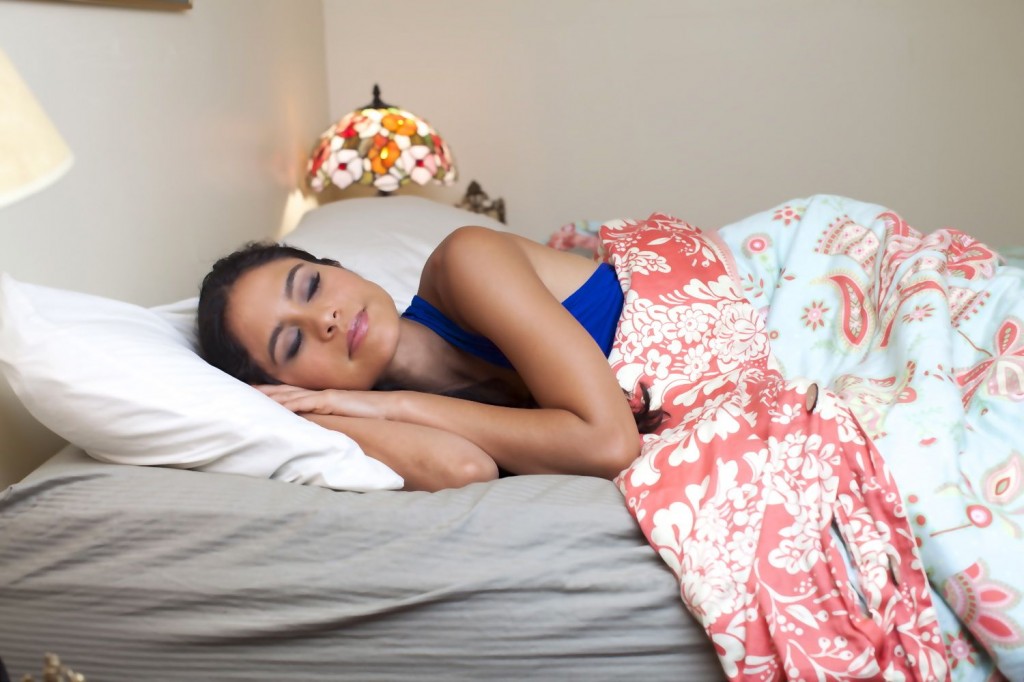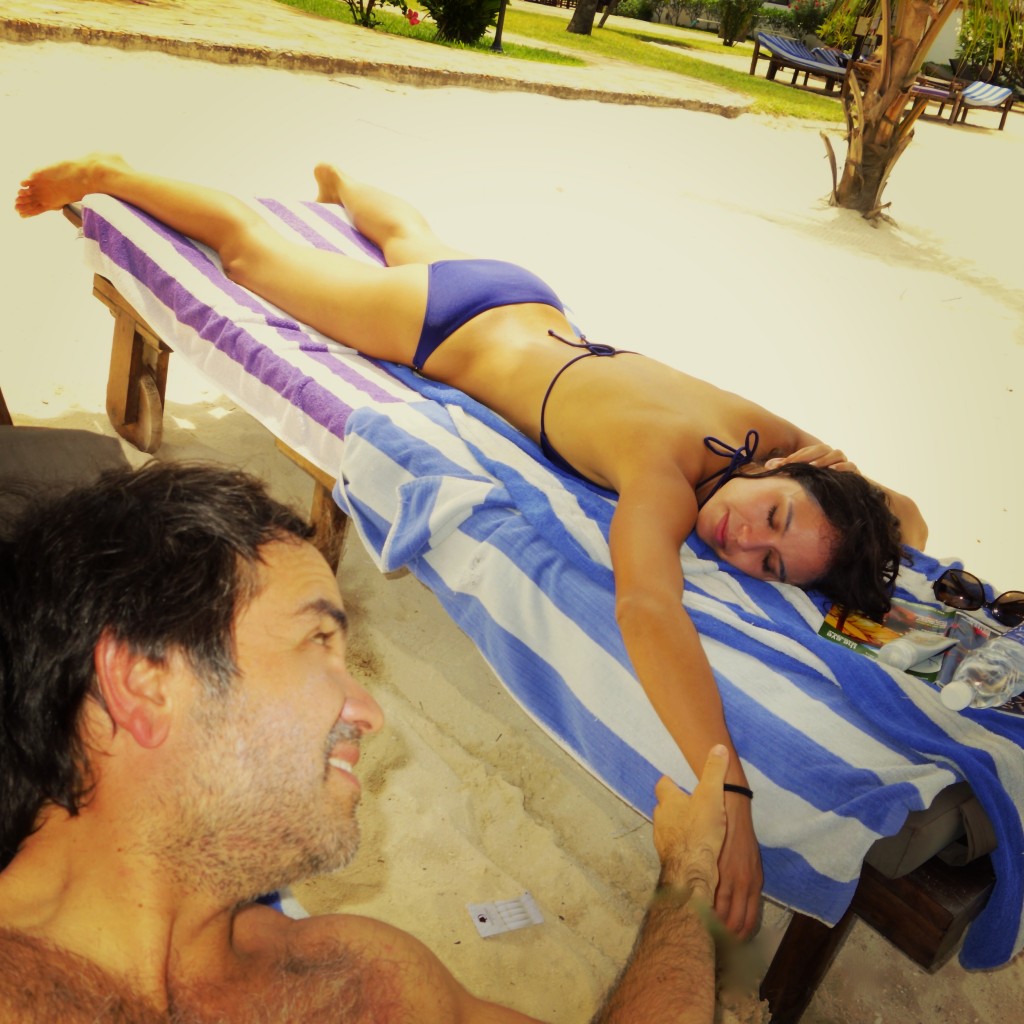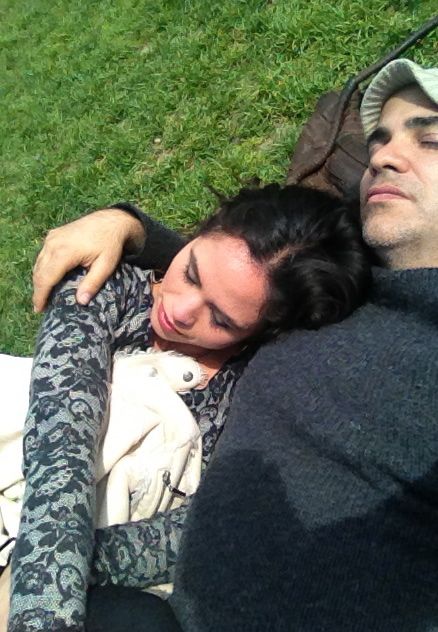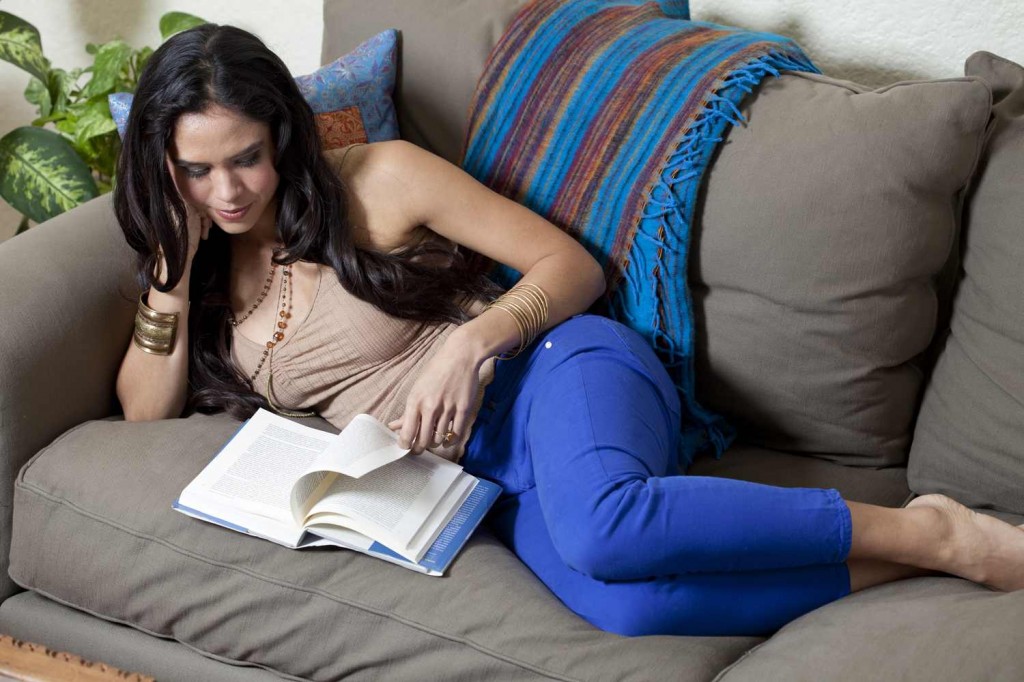
We’ve covered sleep before, but I’m excited because I’ve recently come across some very intriguing information about sleep that I think you’ll want to know.
As you’ll soon see, “over sleeping” — which was traditional recognized as detrimental — may actually bring tremendous anti-aging and beauty benefits!
So let’s jump right in…
Why We Need Sleep
Our bodies’ need for sleep has always fascinated me. The great yoga guru Paramahansa Yogananda talks about how going to sleep reminds us of our deeper consciousness, and that awakening every morning can be seen as a rebirth. It’s a beautiful thought. From a scientific perspective, there are a variety of interesting theories that I think may help us understand why sleep is part of nature. You can read about them in more depth right here:
1) Inactivity
This theory speculates that sleep developed as part of evolution. Namely, that we learned to sleep and be “inactive” at night, in order to keep out of harm’s way and avoid potential predators. The idea is that animals who were still and quiet during this period were more likely to survive than those who were out and about.
2) Energy Conservation
This one says that energy is scarce, and sleep is nature’s way of helping us reduce our energy demands, especially at times (night) when food will be more scarce or difficult to obtain. Research has shown that energy metabolism, including temperature and need for calories, is lower during sleep.
3) Rejuvenation
This third type of theory focuses on the idea that during sleep, our body is able to “restore” and rejuvenate any damage or issues within our body. Other functions shut down, so that our body is able to devote more and more energy toward healing and repairing whatever the body needs to work on. Some of the research we’ll cover in a moment, especially about the aging and health breakdown that occurs when we lack sleep, seem to support this theory.
I think I agree with this theory most, perhaps because I’ve seen such a difference in health and healing when the body expends less energy on food digestion. It makes perfect sense to me that the body would be able focus on repair while its primary functions (movement, sight, discerning sounds, digestion [though some does still occur in the night], conscious thought and problem-solving) are all dormant.
Overall, there’s probably some truth to all theories, and hopefully they give you an idea for why your body needs sleep.
Isn’t it great that something we all love is so good for us? While some of us have to be reprogrammed to love greens or almond milk, most all of us love to snuggle and snooze. I know I do, especially in my amazingly comfortable bed here in Florida. It feels like a spa! Now, let’s talk about how long you should be sleeping.
Controversy Over Sleep Length
Recently, there was a resurfacing of a 2002 study that included over a million participants and found that people who slept 6.5 to 7.4 hours had the lowest rates of mortality. Those who slept either less than 4 hours, or greater than 8 hours, had much high mortality rates.
There’s just one little problem with this study: it was performed on cancer patients, which by itself is not discrediting — however, it could very well mean that those who were already dealing with cancer slept more or less.
In other words, the lack or excess sleep might have been a symptom of the patients with illness, not necessarily the cause! This is one reason why you have to look at studies very carefully.
According to Dr. Daniel Kripke, a professor of psychiatry at the University of California in San Diego:
”We don’t know if long sleep periods lead to death. Additional studies are needed to determine if setting your alarm clock earlier will actually improve your health.”
What’s sad is so many publications took this research and basically published that we only need 7 hours of sleep as a fact, despite the lead researcher not even coming to that conclusion!
Could More Be Better?
One group of people the 7-hour “rule” certainly does NOT apply to is athletes.
Let me give you an example. Stanford University is home to one of the best sleep research departments in the world. Now, college students, especially those busy playing sports at a challenging academic institution, are notorious for not getting enough sleep. All too often, they were getting sleep in the 6-7 hour range.
However, they recently created an experiment where the players slept 10 hours a night for a five to seven week period. The results were mind-blowing! It was almost as though they had been taking performance enhancing drugs. Their speed, accuracy, physical, mental and emotional well being were all measurably better.
Lending credence to the “restorative theory we covered a moment ago, an article published on Harvard Medical School’s site explains that major restorative functions “like muscle growth, tissue repair, protein synthesis, and growth hormone release occur mostly, or in some cases only, during sleep.”
How Athletes Win Their Competitions… By Getting more Zzzz!
As I began to research more and more athletes and their quantity of sleep, I was pretty stunned. Many of the most elite performers sleep over ten hours per day — some up to twelve!
- Usain Bolt, Olympic gold medalist and the “fastest man alive,” sleeps up to 10 hours per day. He says: “Sleep is extremely important to me – I need to rest and recover in order for the training I do to be absorbed by my body”
- Michael Phelps, history’s greatest male swimmer, also sleeps around 10 hours per night.
- Basketball star and 4-time league MVP, Lebron James, reportedly gets around 12 hours most nights.
- And Roger Federer, the greatest tennis player of the last decade, also gets 12 hours. He says: “If I don’t get 11-12 hours a day, it’s not right.”
And here are some interesting facts about sleep and performance:
- Getting over 8 hours of sleep per day, helped tennis players experience 42% increase in hitting accuracy
- Your ability to make split-second decisions increases by over 4.3% after you’ve had adequate sleep
- Athletes who were sleep deprived for 4 days lost 20 lbs on their bench press! After 4 days of restricted sleep, athletes maximum bench press drops 20lbs
Of course, you might be thinking — “Okay, but these are athletes who train hard for many hours each day, of course they need more sleep!” That’s true.
Perhaps you think that getting 10 hours would be “oversleeping” for you.
Well, let me just say that there is a growing body of researchers who don’t believe there is such a thing as oversleeping. For instance, University of Pennsylvania M.D., Dr. Sigrid Veasey, puts it bluntly: “You can never get ‘too much’ sleep. When you have had enough sleep you will wake up.”

Here in Zanzibar, after gorilla trekking and working with our charity, Gardens for Health International. When you need to sleep, you need to sleep!
The Connection Between Adequate Sleep and Beauty
To this point, we’ve discussed our bodies’ overall need for sleep, and how research around athletes is perhaps helping us understanding why more might be better, at least in many cases.
Now, let’s look at some research directly connected to beauty. While you might not be an Olympic athlete, here is the connection we ALL care about.
In a first-of-its-kind clinical trial, University Hospitals Case Medical Center discovered a direct connection between poor sleep and accelerating aging, especially of the skin.
Using the Pittsburgh Sleep Quality Index, which accounts for sleep length and overall quality, the researchers examined 60 pre-menopausal women between the ages of 30 and 49. Half of participants fell into the poor quality sleep category.
They discovered:
- Poor quality sleepers showed increased signs of intrinsic skin aging including fine lines, uneven pigmentation and slackening of skin and reduced elasticity. Using a skin age scoring system, they found that poor sleepers had skin with TWICE as much aging!
- They also found that those in the quality sleep group recovered more efficiently from damage and other stressors, like the sun. This may lend some validity to the idea that sun is NOT the only big issue with skin aging, but other factors that reduce our ability to handle the sun!
- Lastly, poor sleepers were nearly TWICE as likely to be overweight! For example, 23% of the “good quality” sleepers were obese, versus 44% in the group that reported poor quality.
Quality AND Quantity!
Clearly, sleep quality is very important. Yet, this research and the next study I introduce you to seem to say more and more that eight plus hours might be ideal for you — especially if you work out, work long hours or have higher stress levels.
Unfortunately, when many people get busy or stressed, they often get LESS sleep — which is the worst thing you can do. This can lead to long-term sleep deprivation, which is one of the biggest enemies of beauty imaginable.
A study at the University of Stockholm, Sweden examined human subjects in two distinct scenarios:
- After eight hours of normal sleep, and…
- After 31 hours of sleep deprivation.
They found that sleep deprivation produced visible signs of aging, including:
- More hanging eyelids
- Redder eyes
- More swollen eyes
- Darker circles under the eyes
- Paler skin
- More wrinkles
- Fine lines
- Droopy corners of the mouth.
I’m with you, in thinking to yourself as you read this list, No thank you!
I think this and the previous study lead to a pretty definite conclusion: Sleep is critical for optimum beauty — and that includes both adequate quality and quantity.
3 Tips to Learn Your Body’s Unique Need for Sleep
Now, let me give you a few tips along with some insight about how you can learn your body’s unique sleep needs. First, let’s start off with fundamentals.
- Avoid stimulants of any kind past the afternoon hours — this includes green tea, black tea, large amounts of chocolate (though a little bit of dark chocolate, especially if you are not too sensitive, can be okay as a “cleaner” dessert/sweet option) and definitely no coffee. These stimulants can keep your nervous system in “fight or flight mode” and ruin your sleep and rejuvenation that night.
- Cut or eliminate alcohol, except on special occasions. Sure, a little bit of wine at dinner or drinks with friends once in a while can be nice, but if you want maximum benefit from sleep, it’s important to avoid alcohol on most nights. Some research shows that just one drink can reduce growth hormone (a key anti-aging hormone) by as much as 75%! [5] Yikes! That is enough to make sure you pick and choose carefully when you want to indulge in a cocktail, right? Growth hormone is most active during sleep…
- Start to wind your mind down hours before bed. One of the biggest causes of insomnia is that your mind is simply too active. In that mentally active state, you remain stimulated by thoughts and it’s significantly harder to fall asleep. This is one reason why I think relaxing reading (not computer use or phone use) with a real book (not an e-reader) and meditation is so beneficial at night.
I have some more tips, but I’m going to save some of those for a course that I have planned for next month, free as we launch the pre-sales of the next Beauty Detox book! ;)
Last note: Whether you need 8, 9 or 10 hours will be totally up to you and your ability to listen to your body. Do your best to raise the quality of your sleep, track the number of hours you get, and then assess whether you feel truly rested in the morning.
If 7-8 hours doesn’t cause you to feel your best, you may need more. It’s important, so you may have to modify parts of your life, and cut out unnecessary evening activities, like TV, as I have. I was never a big TV watcher, but a half hour or a hour here and there can keep you from going to bed earlier, so you have to make conscious choices.
With time and self-awareness, you’ll learn to recognize the rough amount of hours you need each night — and you can set up your routine to support that.
I hope you enjoyed this little sleep odyssey we took together today, and I look forward to sharing more info with you soon.
Here’s to some wonderful, quality beauty sleep for you and all!




It’s funny I’m reading this post because I normally wake up around 6 or 7 am and today I woke up at 9am and got way more sleep than I planned and it feels amazing!! Thanks for the great information. :)
Great read.
Would sleep that is split over the day also provide the same benefits listed above?
For eg 7-8hours at night & a nap between training in the afternoon?
Good question! Need to look into that, but I know the benefits of napping are well documented.
Thanks for this, Kim! Definitely a good reminder of why I need my beauty z’s! Any thoughts on the theory that’s it’s better to go to bed early in the night than to sleep into the morning? (Ie bed by 10pm versus sleeping in till 10am? )
Yes, it has to do with melatonin and other factors, maybe we’ll do a post about that!
I definitely like oversleeping at least once a week (usually on a Sunday morning, if not also Saturday) as well as nap once a week in the afternoon (again, usually on a Sunday). If I feel groggy from oversleeping / napping, that’s usually because I didn’t have enough sleep in the first place. Otherwise, I feel refreshed. But, my skin appears firmer, smoother, poreless and glows (and no dark undereye circles) after oversleeping and napping. My body also feels better – firmer and tighter. I wish people paid attention to how important sleep is; to me, it’s a form of exercise.
Hi Kimberly! I’m wondering what happens if you’ve had several years of very bad sleep and sleep deprivation. Is it possible to regain any of what was lost by “making up for” sleep? Also, if you are a light sleeper/insomniac, are there any suggestions for knowing when you have had enough sleep since waking up is a regular thing? Thanks Kimberly!
Love this post! I am a firm believer in the health and beauty benefits of getting plenty of sleep and that the earlier you go to bed the better! I would love to read about research confirming that :-)
I am such an advocate when it comes to getting adequate sleep every night. My personal experience is that if I get less sleep, I tend to have these “blank” moments or it feels as if my mind is muddled. Great article. – Angie Sophora